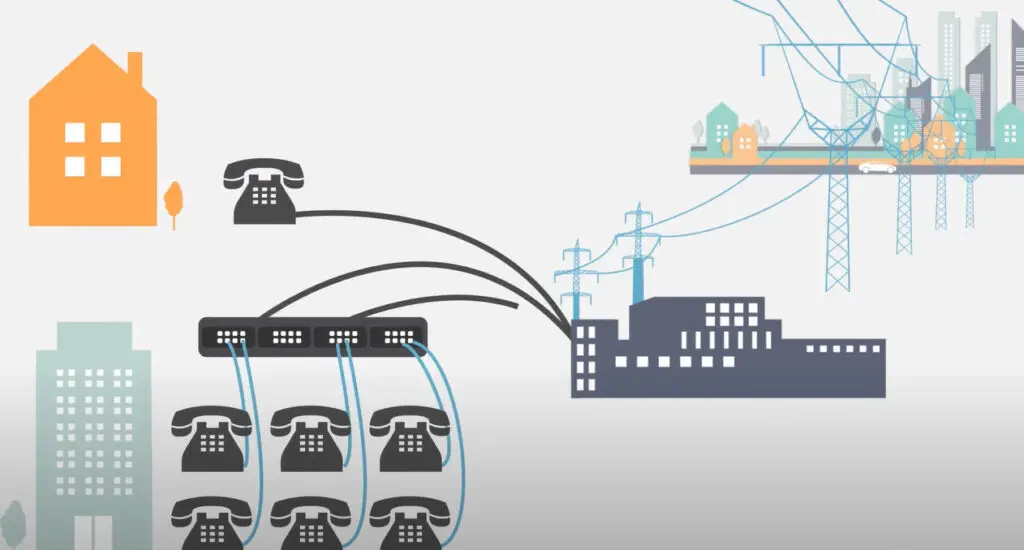In today’s digital landscape, effective business communication goes beyond simple landlines, embracing cloud-based systems, VoIP, and video conferencing.
When choosing a telecom provider for your business, it’s crucial to consider network reliability, cost-effectiveness, customer support, scalability, and services offered. Making the right choice ensures enhanced efficiency, cost savings, and robust support for your growing business needs.
From understanding different types of services to comparing providers and their offers, by the end of this read, you’ll have a clear direction on choosing wisely.

Key Factors in Choosing a Telecom Provider
When it’s time to pick the right telecom provider for your small business, there are several factors you need to consider.
- Network Reliability. You’re looking for a service that won’t disappoint you during peak business hours or critical moments. Check out customer reviews and network outage reports before making your choice.
- Cost-effectiveness. Sure, we all want top-notch service, but at what price? Make sure to do a thorough cost-benefit analysis considering not just monthly fees but also installation charges, equipment costs, and any potential penalties for exceeding package limits.
- Customer Support. You don’t want to be left hanging when an issue arises with your communication systems. Look for providers known for their quick response times and knowledgeable support staff.
- Scalability. It is wise to choose a telecom provider that can easily adjust its services according to your growing demands without causing major disruptions or significant additional expenses.
- Services Offered. Nowadays, it’s more than just phone lines; look into internet connectivity options, cloud communication services like VoIP (Voice over Internet Protocol), and video conferencing capabilities.
Mistakes to Avoid When Choosing a Telecom Provider
It’s exciting. Taking that leap and setting up your own small business. But you might not have considered that choosing the right telecom provider can make or break your success. Let’s dive into some common mistakes I’ve seen others make when picking their provider.
- Not considering growth. Your business may be small now, but what about in five years? Ten years? Make sure your telecom provider can scale with you. Nothing hampers progress like outgrowing your infrastructure.
- Ignoring customer service quality. Yes, we all want the best deal on our services. But what happens when things go wrong (and they will)? Is there a dedicated support team available 24/7? Or are you trawling through FAQ pages and waiting days for an email response?
- Neglecting contract details. It’s easy to get swept up in sales pitches and promotional prices, but always read the fine print! Are there hidden fees for equipment or installation? What about early termination penalties?
- Network security measures provided by your telecom company. In today’s digital age, protecting client data should be at the forefront of any business owner’s mind.
Comparative Analysis of Top Providers

Navigating the telecom world can feel like a maze sometimes. But trust me, getting a grip on the top players in the industry can make a world of difference to your operations. Ready to find the best fit for your business? Let’s dive in!
Here’s the rating for each provider based on the provided data:
| Provider | Rating | Coverage | Services | Pricing | Customer Support | Notable Points |
|---|---|---|---|---|---|---|
| AT&T ⭐⭐⭐⭐ | Nationwide, especially in urban areas | Mobile services, internet connectivity, TV packages | Mid to high-end, bundle deals available | Solid, multiple channels | Robust network in urban areas | |
| Verizon ⭐⭐⭐⭐⭐ | Extensive, including rural areas | Mobile, fiber-optic broadband, smart home integration | Higher side but reliable and fast | High marks, 24/7 | Known for rural connectivity | |
| T-Mobile ⭐⭐⭐⭐ | Rapidly expanding | Mainly mobile, expanding into home internet | Competitive, innovative plans | Responsive | Expanding due to Sprint merger | |
| Comcast (Xfinity) ⭐⭐⭐ | Urban and suburban | Broadband, TV packages, home security, mobile services | Varies, wide range of packages | Mixed reviews | Wide range of services | |
| Spectrum (Charter) ⭐⭐⭐⭐ | Broad, especially underserved areas | Internet, TV, mobile, home voice | Middle of the road, promotions for new customers | Standard, some longer wait times | Covers areas missed by other major providers |
Rating Key:
- ⭐⭐⭐⭐⭐: Excellent
- ⭐⭐⭐⭐: Very Good
- ⭐⭐⭐: Good
- ⭐⭐: Fair
- ⭐: Poor
Detailed Breakdown of Modern Telecom Services
The evolution of technology has dramatically reshaped the telecom industry, bringing a range of services that cater to modern business and individual needs. Here’s a detailed breakdown of the primary components of modern telecom services.

- Cloud-based Phone Systems:
- Blueprint: Instead of relying on traditional wires and equipment, these systems manage and route your calls online.
- Advantages: Say goodbye to bulky hardware and hello to flexibility! Move, expand, or downsize without the fuss. Plus, enjoy features like voicemail-to-email and easy integration with other business tools.
- Perfect For: Businesses that want a modern, scalable solution without the constraints of old-school systems.

- VoIP services (Voice over Internet Protocol):
- Blueprint: Imagine turning your voice into digital data and sending it online. That’s VoIP in a nutshell.
- Advantages: Crystal clear calls, often cheaper than traditional lines, and comes with a bunch of cool features like call forwarding, video calls, and even text messaging in some cases.
- Perfect For: Companies looking for a cost-effective communication method without sacrificing quality. It’s ideal if you have decent internet bandwidth.

- Video Conferencing Capabilities:
- Blueprint: This isn’t just a camera and a screen. Modern video conferencing is about connecting teams across continents, collaborating in real time, and closing deals without hopping on a plane.
- Advantages: Enhance team collaboration, save on travel costs, and foster stronger relationships with clients and partners. Plus, with features like screen sharing and recording, it’s more than just face-to-face chatting.
- Perfect For: Businesses operating in today’s global marketplace. Especially if you’ve got remote teams or clients spread out geographically.
Security Considerations in Telecom

Regarding telecom, security isn’t just a nice-to-have; it’s an absolute must. With the amount of data flowing through today’s networks, businesses of all sizes need to be hyper-aware of the vulnerabilities and the steps needed to safeguard their systems. Here’s what you need to keep an eye on:
- Data Encryption: Whenever data is transmitted over a network, there’s a risk of interception. Ensuring your telecom provider uses top-notch encryption is crucial. It turns data into a code, preventing unauthorized access.
- Firewalls: Think of this as any network’s first line of defense. A solid firewall will monitor and control incoming and outgoing network traffic based on predetermined security policies.
- Multi-factor Authentication (MFA): This requires users to provide multiple forms of identification before gaining access. It’s a step up from the usual username and password, offering an added layer of protection.
- Regular Updates: Like any technology, telecom systems can become outdated. Ensure your provider frequently updates their software to protect against newly discovered vulnerabilities.
- Network Monitoring: Continuous oversight of your telecom network can catch unusual activity before it becomes problematic. Providers should offer 24/7 monitoring to detect and respond to potential threats swiftly.
- Physical Security: While most threats come from the online world, don’t underestimate the importance of physical security. Data centers should be guarded and monitored to prevent unauthorized access.
- Employee Training: A lot of breaches happen due to human error. Making sure everyone in your business is aware of security protocols and the risks involved is essential.

Benefits of Choosing the Right Telecom Provider
I’ve learned over time, it’s all about making smart choices. And when it comes to running a small business, choosing the right telecom provider can indeed make a world of difference.
- Smart picks improve efficiency. With the right provider, you’ll have access to top-notch communication tools like high-speed internet and cloud services – vital for staying competitive in today’s digital age. What does that mean? Think of faster customer service responses, seamless virtual meetings, and smoother operation overall.
- Cost savings are major perks, too. Many small businesses spend unnecessary amounts on telecom services because they didn’t choose wisely initially. A good provider offers flexible plans tailored to your specific needs – so you only pay for what you use! Isn’t that something?
- Reliability. When you select a reliable telecom provider, these annoyances become things of the past. It’s like having a sturdy foundation beneath your house; everything else falls into place with strong support.
- Customer support. Facing technical issues during the busiest hours can be a nightmare. A responsive telecom provider can be a game-changer in such situations.
Frequently Asked Questions
- Can I switch providers easily if I’m unsatisfied with my current one?
- You can, but be sure to check your contract. Some providers might have early termination fees or other penalties. It is always best to read the fine print before making a move.
- Is a cloud-based phone system the same as VoIP?
- Not exactly. While both use the internet, a cloud-based system is specifically hosted on remote servers (the cloud), while VoIP is a technology that sends voice communications over the internet. Please consider the cloud-based system as the broader category, with VoIP as one of its key components.
- Are there telecom solutions specifically tailored for small businesses?
- Absolutely! Many providers offer solutions crafted for the unique needs of small businesses, balancing cost, functionality, and scalability.
- Do I need a high-speed internet connection for VoIP and cloud-based services?
- Generally, yes. The better your internet speed, the clearer and more reliable your VoIP and cloud-based services will be. Ensuring your bandwidth can handle these services, especially with multiple users, is essential.
- Can I integrate my current business tools with a new telecom system?
- Many modern telecom services allow integration with existing business tools, especially cloud-based ones. However, always check with the provider to ensure compatibility.
- How does multi-factor authentication (MFA) improve telecom security?
- MFA adds an extra layer of protection. Instead of just requiring a password (which can be stolen or guessed), it requires a second verification form, making unauthorized access more challenging.
References
Website Resources:
- Federal Communications Commission (FCC). https://www.fcc.gov/
- Telecommunications Industry Association (TIA). https://tiaonline.org/
- International Telecommunication Union (ITU). https://www.itu.int/
- SANS Institute. https://www.sans.org/
- Cybersecurity & Infrastructure Security Agency (CISA). https://www.cisa.gov/
Video References:
Logitech
Yeastar
AeroCom Inc
Simple Alpaca

